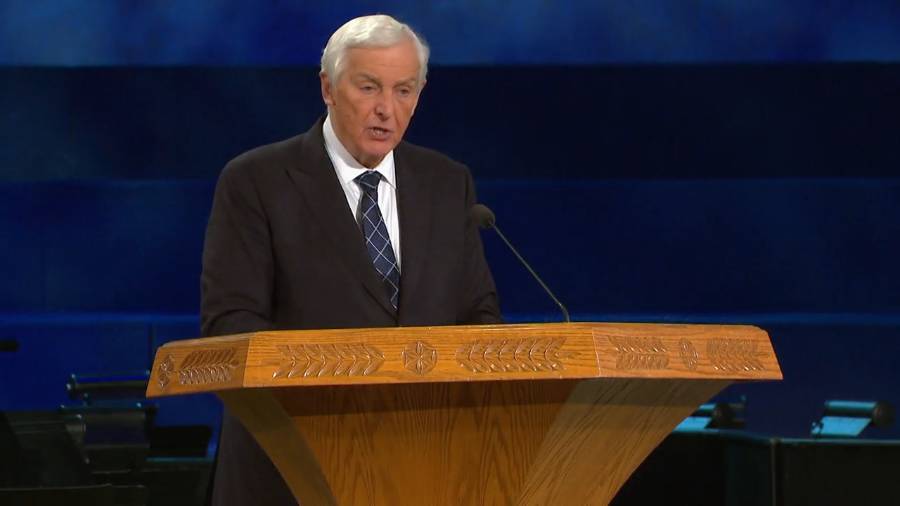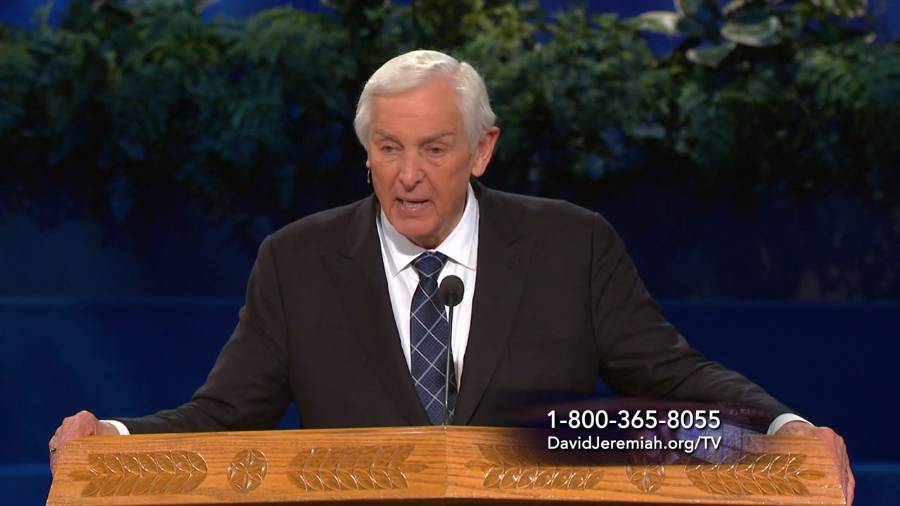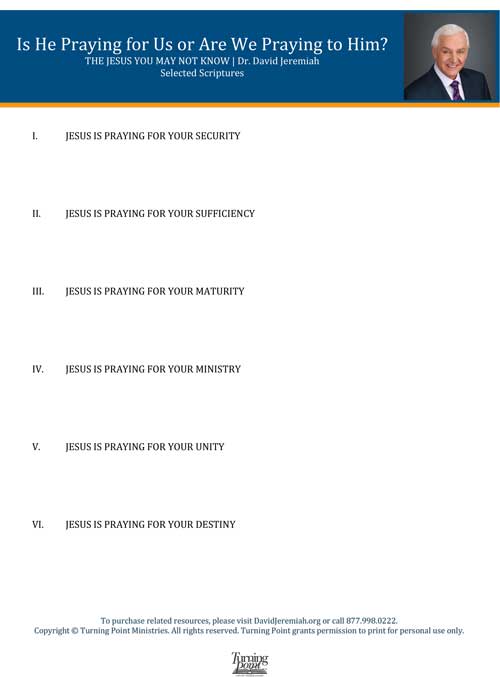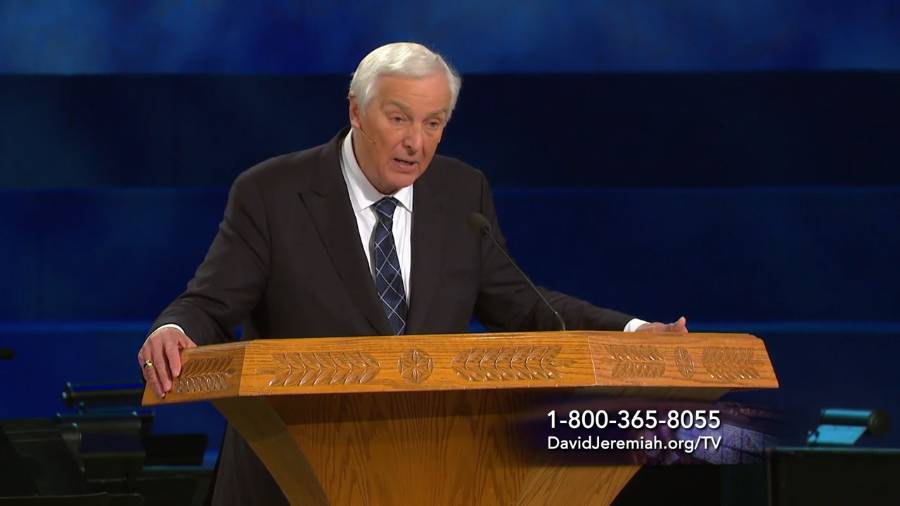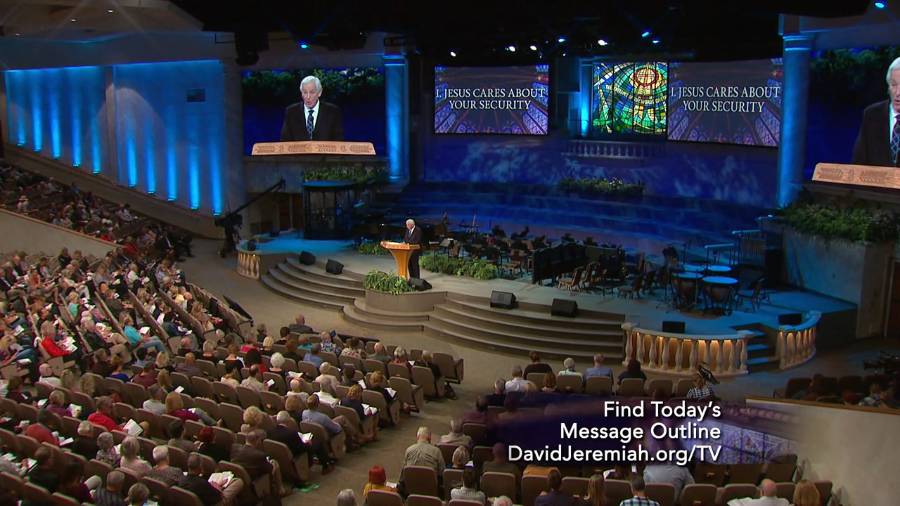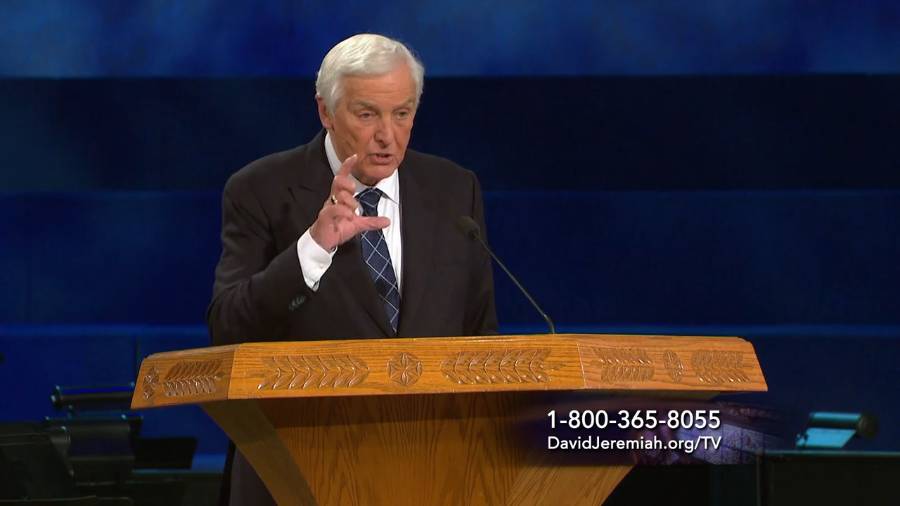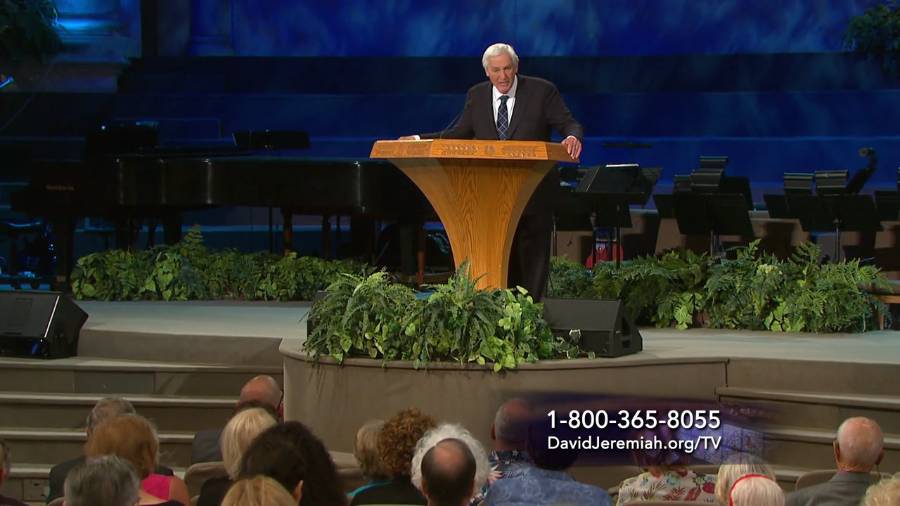The Jesus You May Not Know
Learn toFathomJesus like never before
Resources from David Jeremiah to aid in your journey from knowing about Jesus to knowing Jesus.
Is He Praying for Us or Are We Praying to Him?
Thanks for downloading your free resource!
Thanks for downloading your free resource!

That Others Will Know
By David Jeremiah
Unless you’ve been out of this world for the last ten years, you have probably heard of LeBron James, by most accounts the leading professional basketball player in the world—and one of the greatest of all time. His accolades as a professional in the NBA are legendary: Rookie of the Year, fifteen All–NBA teams, four MVP awards, three NBA finals MVP awards, All–Defensive honors six years in a row. His teams have appeared in the NBA finals nine times and won three times. Various media outlets have ranked him anywhere from fifth to first in the list of greatest NBA players of all time. That’s the story of LeBron Raymone James, Sr.
But get ready for LeBron Raymone James Jr.—better known as “Bronny.” This fifteen–year–old eldest son of LeBron Sr. has already been dubbed the incarnation of his famous father. Standing 6’ 2” tall as a young teen, with the same muscular build of his father, Bronny James could easily fill his father’s shoes in the years to come. As a pre–teen playing in city leagues, he was featured in highlight reels circulating among the media and college recruiters. And college recruiters have been watching him ever since. He’s already received college offers.
On his personal Instagram account in late 2019, LeBron Sr. posted side–by–side photos of him and Bronny dunking the basketball—their form was identical!—with the hashtag #LIKEFATHERLIKESON. He also wrote, “It’s My Job to pass along [the] Blueprint.” As Bronny James continues to grow and mature, he will no doubt be asked many times, “Are you LeBron’s son? You look and play just like him!”
Many of you know I love basketball, so it was easy for me to grab this example of “like father, like son” as a way to introduce this article. But I have a more serious point to make: Do people ever look at us and wonder, “Is that person a Christian? He/she seems to act just like what I’ve read about Jesus.”
Do people see Christ in us?
More importantly, are they attracted to Christ through His life in us?
Like LeBron James is doing for his son, God has given us a blueprint for our life. And that blueprint is Jesus Christ Himself. Our mission in life is to live such Christ–like lives that others will desire to know and follow Him as well.
It’s no surprise that a young man would grow up and become a carbon copy of his father in appearance and talent. But it is certainly not guaranteed in the human realm. In fact, while there are almost always resemblances, children rarely become replicas of a parent. But in the spiritual realm, God’s plan is for that to happen. In fact, part of the reason for that plan is so we can reveal Jesus Christ to the world. When Jesus left this earth, He said His followers would do “greater works” than He did (John 14:12) by covering the earth with human ambassadors of His kingdom.
Romans 8:29 makes it clear that we will ultimately become like Christ: “For whom [God] foreknew, He also predestined to be conformed to the image of His Son, that [Christ] might be the firstborn among many brethren” (emphasis added). When will that conformation take place? John wrote, “When He is revealed, we shall be like Him, for we shall see Him as He is” (1 John 3:2). So when we meet Christ in glory, we will be like Him—one of His “many brethren” who have become like the Second Person of the Trinity.
But what about before then? How are we to become like Christ in order that others will see Him in us and come to know Him personally?
By Our Love
In the second century A.D., when the Early Church was growing in size and influence, the Roman Emperor Hadrian sent a man named Aristides to gather information about the people known as “Christians” (little Christs, or Christ–ones). Aristides’ report contained mixed pieces of evidence, but one has stood the test of time: “Behold! How they love one another.”
That piece of evidence, along with Jesus’ timeless words in John 13:35—“By this all will know that you are My disciples, if you have love for one another”—inspired a priest named Peter Scholtes to write what became one of the most popular worship songs of the 1960s’ Jesus People movement, “They’ll Know We Are Christians.” The refrain of that hymn says, “And they’ll know we are Christians by our love, by our love, yes they’ll know we are Christians by our love.”
The Bible says God is love (1 John 4:8, 16) and Jesus “is the image of the invisible God” (Colossians 1:15)—which means Jesus is love, too.
If we are going to represent Christ in the world so that others will know Him, we have to be people who love.
People of faith, yes; of hope, yes. But Paul wrote that most importantly we are to be people who love (1 Corinthians 13:13). God loved humanity so much that He gave His only Son to save us—the greatest expression of love there can ever be (John 15:13).
After His ascension to heaven, Jesus sent the Holy Spirit to manifest His love and life through His followers by giving them spiritual gifts and fruit.
By Our Gifts
The easiest way to think about the gifts of the Spirit is to consider them the hands of Jesus. God gives us gifts like speaking His Word, serving others, teaching, encouraging, giving, leading, and showing mercy (Romans 12:6–8). Didn’t Jesus do all these? Yes, all these and more as He had the Spirit without measure (John 3:34). It was Jesus’ manifestations of these gifts in His own life that attracted people to Him. And He intends for those same gifts to attract people to Him through us as we manifest Christ’s hands in the world.
But be reminded: Gifts not bathed in the love of God are of no use to God. Paul had to instruct the church at Corinth of this truth—three chapters on spiritual gifts, the middle chapter explaining that gifts without love will turn people away (1 Corinthians 12–14).
By Our Fruit
If the hands of Jesus are the gifts of the Spirit, then the heart of Jesus is the fruit of the Holy Spirit: love, joy, peace, longsuffering, kindness, goodness, faithfulness, gentleness, and self–control (Galatians 5:22–23). In fact, this list expands the priority of love into additional character traits of Jesus that the Spirit intends to manifest in and through us.
Just think:
How often during the day do you encounter love, joy, peace, and the rest of these fruits as you walk through this world? Not nearly enough.
In fact, they are so rare that we remember when we encounter an expression of positive, joyful character traits in others. Some people have confessed to being suspicious after such an encounter: “What’s that person’s deal? Why is she so nice/joyful/thoughtful/loving/kind?”
A friend of mine was spending a night in the emergency room of a major Dallas hospital in a pastoral capacity as a requirement for a seminary class. When a woman was brought in who had tried unsuccessfully to take her own life, he spent time comforting her. Suddenly she looked up and asked, “Are you Jesus?”
Nobody forgot meeting Jesus during His three years of ministry on this earth. And He wants our experience with other people to be the same.
By Our Light
On this we can agree: Our fallen world is a dark world. And it was dark in Jesus’ day as well. That’s why He said, “I am the light of the world” (John 8:12). But then, guess what He told His disciples? “You are the light of the world” (Matthew 5:14). He wants us to be “sons of light” (John 12:36).
People lost in a dark cave immediately focus on the flashlights of the rescuers who have come to save them. In the same way, people living in a dark world will gravitate toward the light of truth and love as soon as they see it. We are the light of Christ in this world. Our mission is to uncover our light and let it shine so that others will learn to “glorify [the] Father in heaven” (Matthew 5:16).
Let us manifest Jesus through our love, gifts, fruit, and light—that others may know.
This article is an excerpt from the May 2020 issue of Turning Points Devotional Magazine, a ministry of Turning Point with Dr. David Jeremiah. Request your complimentary subscription today!





